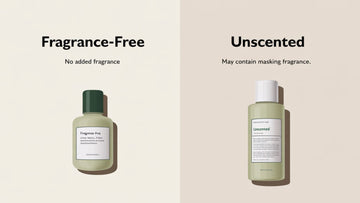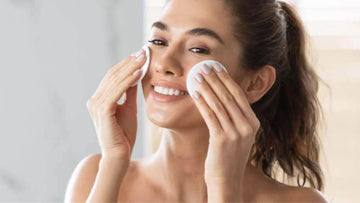Ever felt a bit lost in the skincare aisle, trying to figure out what "fragrance-free" and "unscented" really mean? It's a common puzzle, especially when you're looking for something gentle for your skin. These terms might sound similar, but they actually point to some important differences in how products are made and what's inside them. Knowing the distinction can really help you pick the right items for your skin, whether you have sensitivities or just prefer products without a strong smell. Let's clear up the confusion around fragrance free skincare products and unscented options.
Key Takeaways
- Fragrance-free products contain no added scents, artificial or natural.
- Unscented products might have natural scents from ingredients or use agents to hide smells.
- Fragrance-free items are usually best for sensitive or reactive skin types.
- Unscented products are good for those who just prefer no obvious smell.
- Always check product labels carefully to understand what you're buying.
Understanding Fragrance-Free Skincare
Defining Fragrance-Free Formulations
Fragrance-free skincare products are formulated without any added fragrances, whether synthetic or natural. This means that the product should not contain any ingredients specifically included to impart a scent. It's a key consideration for those with sensitive skin or fragrance allergies. You might still detect a faint smell from the base ingredients, but that's different from an intentional fragrance.
Absence of Synthetic and Natural Scents
When a product claims to be fragrance-free, it should genuinely lack both synthetic and natural fragrances. Natural fragrances, such as essential oils, can still cause irritation for some people. Therefore, true fragrance-free products avoid these altogether. This makes them a safer choice for individuals prone to allergic reactions or skin sensitivities. It's all about minimising the risk of adverse reactions.
Benefits for Sensitive Skin
Fragrance-free skincare is often recommended for those with sensitive skin. Here's why:
- Reduced risk of irritation: Fragrances are a common trigger for skin irritation.
- Lower chance of allergic reactions: Eliminating fragrance reduces the likelihood of allergic contact dermatitis.
- Suitable for various skin conditions: Often recommended for people with eczema, rosacea, or psoriasis.
Choosing fragrance-free options can significantly improve skin comfort and reduce flare-ups, leading to healthier and happier skin.
Key Characteristics of Fragrance-Free Products
Fragrance-free products have several defining characteristics:
- No added fragrance ingredients: This is the most important aspect.
- Minimal scent: Any scent present is due to the natural ingredients.
- Gentle formulations: Often designed to be mild and non-irritating.
- Suitable for sensitive skin: A primary target audience for these products.
- May contain other ingredients: Preservatives, emollients, and humectants can still be present. If you have dry, flaky skin, look for a barrier-supporting ingredient in the product.
Exploring Unscented Skincare Products
Defining Unscented Formulations
Unscented skincare products are formulated without any added scent. This doesn't necessarily mean they are completely without aroma. They might contain ingredients that naturally possess a scent, which is not masked or altered.
Presence of Natural Ingredient Scents
Unlike fragrance-free products, unscented items can still have a subtle aroma. This comes from the natural ingredients used in the formulation. For example, a cream containing shea butter might have a faint, nutty smell. These scents are usually mild and not overpowering, but they are present. It's worth noting that some people actually prefer this, finding it more appealing than a completely odourless product.
Suitability for Non-Sensitive Users
Unscented products are often a good choice for people who aren't particularly sensitive to fragrances but still prefer a more neutral scent profile. They offer a middle ground between heavily fragranced items and those that are completely fragrance-free. If you're not prone to reactions but dislike strong perfumes in your skincare, unscented could be ideal. Understanding your skin type is important here.
Key Characteristics of Unscented Products
Here are some key things to know about unscented skincare:
- No added synthetic fragrances.
- May contain natural ingredients with a mild scent.
- The natural scent is not masked by other chemicals.
- Suitable for those who prefer products without added fragrance.
Unscented products aim to minimise added scents, but the presence of natural aromas means they aren't always odourless. This distinction is important for consumers seeking truly scent-free options.
It's important to remember that unscented doesn't equal fragrance-free. If you're looking for products with absolutely no scent, you'll need to specifically look for fragrance-free skincare.
Distinguishing Fragrance-Free From Unscented
Core Differences in Ingredient Composition
It's easy to assume that 'fragrance-free' and 'unscented' mean the same thing, but there are key differences in what goes into these products. Fragrance-free products are formulated without any added scents, whether synthetic or natural. Unscented products, on the other hand, might contain masking agents to neutralise the smell of other ingredients. So, while both appear to lack a scent, their ingredient lists can be quite different.
Impact on Skin Sensitivity
The presence or absence of fragrance ingredients can significantly impact skin sensitivity. Fragrance-free products are generally considered safer for those with sensitive skin, as they eliminate a common source of irritation. Unscented products, while lacking a noticeable scent, may still contain ingredients that can cause reactions in sensitive individuals. It's always best to patch-test new products, but especially important with unscented options if you have easily irritated skin.
Understanding Masking Agents
Masking agents are ingredients added to unscented products to cover up the natural odours of other components. These agents don't necessarily add a scent themselves, but they prevent the product from having an unpleasant smell. The EPA's Safer Choice programme acknowledges that unscented products may contain chemicals to neutralise or mask odours. However, these masking agents can sometimes be irritants for sensitive skin, defeating the purpose of choosing an unscented product in the first place.
Consumer Expectations Versus Product Reality
Many consumers assume that 'unscented' means the same as 'fragrance-free', leading to potential disappointment or even skin reactions. It's important to read labels carefully and understand that unscented products might still contain ingredients that can cause irritation. The reality is that fragrance-free products offer a more reliable option for those seeking to avoid all added scents and potential irritants. Always check the full ingredient list to ensure the product truly meets your needs.
Choosing between fragrance-free and unscented skincare can be tricky. It's not just about the smell (or lack thereof), but also about what's actually in the product. Understanding the difference can help you make informed decisions for your skin's health and well-being.
Benefits of Fragrance-Free Skincare Products

Minimising Skin Irritation
The primary benefit of fragrance free skincare products is the reduced risk of skin irritation. Fragrances, whether synthetic or natural, are common triggers for dermatitis and other skin reactions. By eliminating these ingredients, fragrance-free products significantly lower the chance of experiencing redness, itching, or burning sensations, especially for those with sensitive skin.
Reducing Allergic Reactions
Allergic reactions to skincare are often caused by fragrance components. These reactions can manifest as hives, swelling, or even eczema flare-ups. Choosing fragrance-free options minimises exposure to these potential allergens, making it a safer choice. It's worth noting the meaning of non-comedogenic can also play a role in reducing skin reactions.
Ideal for Eczema and Rosacea
People with eczema and rosacea have particularly reactive skin. Fragrances can exacerbate these conditions, leading to increased inflammation and discomfort.
Fragrance-free skincare is often recommended by dermatologists as part of a comprehensive management plan for these skin conditions. It helps to calm the skin and prevent further irritation, allowing other treatment products to work more effectively.
Promoting Overall Skin Health
By avoiding potential irritants, fragrance-free skincare supports the skin's natural barrier function. This barrier protects against environmental aggressors and helps to retain moisture. Using fragrance-free products can lead to healthier, more resilient skin over time. Understanding the [difference between fragrance free and unscented skincare products] is key to making informed choices.
Advantages of Unscented Skincare Products
Catering to Scent Preferences
Unscented skincare products are a great option if you simply don't like added fragrances. Some people find strong scents overwhelming or distracting, and unscented products allow them to enjoy their skincare routine without any unwanted smells. It's all about personal preference!
Gentle Formulations for Daily Use
Unscented products are often formulated to be gentle, making them suitable for everyday use. While not necessarily designed for sensitive skin like fragrance-free options, they still tend to avoid harsh chemicals that could cause irritation. This makes them a reliable choice for a daily skincare routine.
Versatility in Skincare Routines
Unscented products can easily be incorporated into any skincare routine without clashing with other scented products you might use, like perfumes or hair products. This versatility allows you to mix and match products without worrying about conflicting fragrances. You can use a scented serum with an unscented moisturiser, or vice versa, to create a personalised skincare experience.
Natural Aroma Without Added Scents
Unscented doesn't always mean completely odourless. These products may contain natural ingredients that have a subtle, inherent scent. For example, a cream with shea butter might have a faint, nutty aroma. This natural aroma can be a pleasant alternative to artificial fragrances, offering a more authentic and less overpowering sensory experience.
Choosing unscented products can be a good middle ground for those who aren't necessarily sensitive to fragrances but prefer a more neutral scent profile in their skincare. It's about finding what works best for your skin and your personal preferences.
Choosing the Right Fragrance-Free Skincare Products

Identifying Your Skin's Needs
Before you even think about buying anything, you need to figure out what your skin actually needs. Is it dry? Oily? A bit of both? Sensitive? Prone to breakouts? All of the above (lucky you!)? Knowing your skin type is the first step in choosing the right fragrance-free products. If you're not sure, maybe try a simple skin type quiz online or even better, chat with a dermatologist. I spent years using the wrong stuff before I finally figured out I had combination skin. What a waste of money!
Reading Product Labels Carefully
Okay, so you know your skin type. Now it's label-reading time. This is where things can get a bit tricky. Look for the words "fragrance-free" – seems obvious, right? But sometimes, companies try to sneak in sneaky ingredients that can still irritate your skin.
Here's what to watch out for:
- "Parfum" or "fragrance" (obviously)
- Essential oils (some people are sensitive to these)
- Masking agents (these cover up smells but can still cause problems)
It's a good idea to check the full ingredient list, even if the product claims to be fragrance-free. Some ingredients, while not technically fragrances, can still cause irritation for sensitive skin. Cross-reference ingredients with known irritants if you're particularly sensitive.
Consulting Skincare Professionals
If you're really struggling to find the right products, or if you have a specific skin condition like eczema or rosacea, it's worth talking to a dermatologist or a qualified skincare therapist. They can assess your skin and recommend products that are specifically suited to your needs. Plus, they can give you advice on how to build a skincare routine that actually works. I wish I'd done this sooner – it would have saved me a lot of time and money!
Popular Fragrance-Free Skincare Examples
Okay, so you're ready to shop. Here are a few popular fragrance-free brands and products to get you started:
- Cetaphil: Gentle Skin Cleanser (a classic for a reason)
- La Roche-Posay: Toleriane range (great for sensitive skin)
- Aveeno: Daily Moisturising Lotion (good for dry skin)
- First Aid Beauty: Ultra Repair Cream (a rich, hydrating cream)
These are just a few examples, of course, and there are loads of other great fragrance-free products out there. The key is to experiment and find what works best for you. Don't be afraid to try samples before you buy full-size products, and always patch-test new products on a small area of skin before applying them to your whole face.
Selecting Appropriate Unscented Skincare Products
Considering Natural Ingredient Scents
When choosing unscented skincare products, it's important to remember that 'unscented' doesn't always mean 'no scent'. These products might still have a subtle aroma from their natural ingredients. Think about whether you're okay with a slight earthy or herbal smell, as some botanical extracts can be quite noticeable. If you're particularly sensitive, even these natural scents could be a problem.
Evaluating Product Efficacy
Don't just pick unscented options because you think they're gentler. Consider whether the product actually does what it claims. Look at the active ingredients and read reviews to see if others have had success with it. A product can be free of added fragrance but still ineffective for your specific skin concerns. Here are some things to consider:
- Does it target your specific skin issue (e.g., acne, dryness, ageing)?
- Are the active ingredients well-researched and known to be effective?
- Does the formula contain other beneficial ingredients like antioxidants or hydrating agents?
Understanding Personal Preferences
Ultimately, the best unscented skincare product is one that you enjoy using. Think about the texture, how it feels on your skin, and whether it fits into your existing routine. Some people prefer lightweight lotions, while others like richer creams. If you hate the way a product feels, you're less likely to use it consistently, which will impact its effectiveness.
It's worth experimenting with a few different brands and formulations to find what works best for you. Don't be afraid to try samples or smaller sizes before committing to a full-sized product.
Popular Unscented Skincare Examples
There are loads of great unscented skincare products out there. Here are a few popular examples to get you started:
- CeraVe Moisturising Cream
- Vanicream Gentle Facial Cleanser
- Bioderma Sensibio H2O Micellar Water
- Eucerin Original Healing Cream
- Cetaphil Daily Facial Moisturiser with SPF 15
Conclusion
So, there you have it. Figuring out the difference between "fragrance-free" and "unscented" skincare isn't too tricky once you know what to look for. Basically, if you've got really sensitive skin, or you just want to play it super safe, go for "fragrance-free" products. They're made without any added stuff to make them smell nice, or even to hide other smells. "Unscented" products, though, might have things in them to make sure they don't smell like anything, which could still be a problem for some people. It's all about checking those labels carefully and knowing what your skin likes. Your skin will thank you for it!
Frequently Asked Questions
What does "fragrance-free" mean for skincare?
Fragrance-free means a product has no added smells, whether they're made in a lab or come from nature. This is great for people with sensitive skin because it helps avoid irritation.
What does "unscented" mean in skincare?
Unscented means a product doesn't have a noticeable smell, but it might still have ingredients that naturally have a light scent. Sometimes, they even add things to hide any smells from the ingredients.
What's the main difference between fragrance-free and unscented products?
The main difference is that fragrance-free products have absolutely no added scents, while unscented ones might have natural smells from their ingredients or even special stuff added to make sure they don't smell like anything.
Are fragrance-free products better for sensitive skin?
Yes, fragrance-free products are usually better for sensitive skin because they remove common irritants. Unscented products might still have natural scents that could bother very sensitive skin.
How can I tell if a product is truly fragrance-free?
You should check the product's ingredient list carefully. Look for terms like "fragrance-free" or "no added fragrance." If it just says "unscented," it might still have hidden scent-masking ingredients.
What are the benefits of using fragrance-free skincare?
Fragrance-free products help stop skin irritation, redness, and allergic reactions. They are especially good for skin conditions like eczema or rosacea, helping your skin stay calm and healthy.





